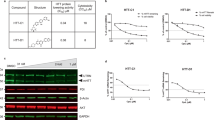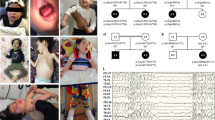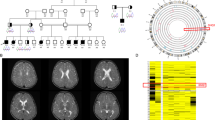Abstract
We report compound heterozygous variants in HTT, the gene encoding huntingtin, in association with an autosomal recessive neurodevelopmental disorder. Three siblings presented with severe global developmental delay since birth, central hypotonia progressing to spastic quadraparesis, feeding difficulties, dystonia (2/3 sibs), prominent midline stereotypies (2/3), bruxism (1/3), high myopia (2/3), and epilepsy (1/3). Whole exome sequencing identified compound heterozygous variants in HTT that co-segregated in the three affected sibs and were absent in an unaffected sib. There were no additional variants in other genes that could account for the reported phenotype. Molecular analysis of HTT should be considered, not just for Huntington’s disease, but also in children with a Rett-like syndrome who test negative for known Rett and Rett-like syndrome genes.
Similar content being viewed by others
Log in or create a free account to read this content
Gain free access to this article, as well as selected content from this journal and more on nature.com
or
Change history
11 November 2016
This paper has been amended since online publication and a corrigenda also appears in this issue
References
Gusella JF, MacDonald ME : Huntington's disease: seeing the pathogenic process through a genetic lens. Trends Biochem Sci 2006; 31: 533–540.
Lee JM, Ramos EM, Lee JH et al: CAG repeat expansion in Huntington disease determines age at onset in a fully dominant fashion. Neurology 2012; 78: 690–695.
Duyao MP, Auerbach AB, Ryan A et al: Inactivation of the mouse Huntington's disease gene homolog Hdh. Science 1995; 269: 407–410.
White JK, Auerbach W, Duyao MP et al: Huntingtin is required for neurogenesis and is not impaired by the Huntington's disease CAG expansion. Nat Genet 1997; 17: 404–410.
Auerbach W, Hurlbert MS, Hilditch-Maguire P et al: The HD mutation causes progressive lethal neurological disease in mice expressing reduced levels of huntingtin. Hum Mol Genet 2001; 10: 2515–2523.
Ambrose CM, Duyao MP, Barnes G et al: Structure and expression of the Huntington's disease gene: evidence against simple inactivation due to an expanded CAG repeat. Somat Cell Mol Genet 1994; 20: 27–38.
Lopes F, Barbosa M, Ameur A et al: Identification of novel genetic causes of Rett-syndrome like phenotypes. J Med Genet 2016; 53: 190–199.
McFarland KN, Huizenga MN, Darnel SB et al: MeCP2: a novel Huntingtin interactor. Hum Mol Genet 2014; 23: 1036–1044.
Author information
Authors and Affiliations
Corresponding author
Ethics declarations
Competing interests
The authors declare no conflict of interest.
Rights and permissions
About this article
Cite this article
Rodan, L., Cohen, J., Fatemi, A. et al. A novel neurodevelopmental disorder associated with compound heterozygous variants in the huntingtin gene. Eur J Hum Genet 24, 1826–1827 (2016). https://doi.org/10.1038/ejhg.2016.74
Received:
Revised:
Accepted:
Published:
Issue date:
DOI: https://doi.org/10.1038/ejhg.2016.74
This article is cited by
-
Computational insights into missense mutations in HTT gene causing Huntington’s disease and its interactome networks
Irish Journal of Medical Science (1971 -) (2023)
-
Antisense Oligonucleotide Therapy: From Design to the Huntington Disease Clinic
BioDrugs (2022)
-
Therapeutic approaches to Huntington disease: from the bench to the clinic
Nature Reviews Drug Discovery (2018)
-
Whole exome sequencing of Rett syndrome-like patients reveals the mutational diversity of the clinical phenotype
Human Genetics (2016)



